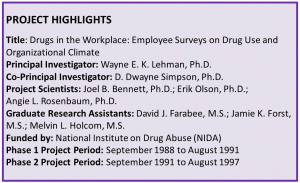
Concern about drug abuse in the United States work force has increased in recent years because of its serious implications for worker productivity and health. The causes and prevalence of drug use in different work settings presumably reflect greater social acceptance of some forms of drug use, increased availability of drugs, and factors in the workplace such as stress and boredom. Although objective data concerning the size or effects of drug use in the work site are limited, larger numbers of employers are implementing mandatory drug testing programs to identify drug users.
This project addressed the need for more empirical information and for a clearer understanding of this complex problem. Data in the first phase of the research were obtained from confidential self-report questionnaires completed by a sample of 2,000 employees in a large southwestern city in the U.S. The project was extended under a 5-year grant which added a second large municipal workforce and a smaller suburban municipality, and replicated the survey over a 3-year interval at the two larger sites. Approximately 3,400 surveys were completed in the three sites in the second phase.
The surveys included information on employee background, organizational climate and working conditions, self-reported drug use on and off the job, perceived drug use among co-workers, attitudes toward drug use and related policies on drug testing, employee well-being, and job performance indicators such as absenteeism, sick days, accidents, and health care costs.
Participation in the study was voluntary and precautions were taken to insure confidentiality of responses.
The long-term objectives of the projects were to develop tools for assessing substance abuse risk in the workplace and to identify factors which contribute to drug use and impaired job performance. Major findings have been that personal background factors, particularly general deviance indicators, are the strongest predictors of personal substance use, and that substance use has strong associations with negative job behaviors (e.g., psychological withdrawal, antagonistic behaviors, accidents, and exposure to workplace violence). The complex role of policy, work group processes, and organizational culture also have been examined. Findings show that employee tolerance for co-worker substance use, attitudes toward discrete policy components, and work group drinking climates are each predictive of risk for substance-use related problems.
Results of this project led to the development of a prevention training program that is designed to address work group cultures and permissive attitudes that tolerate or enable employee substance use.
Publication Lists
Selected Publications from this Research
Bennett, J. B., & Lehman, W. E. K. (1998). Workplace drinking climate, stress, and problem indicators: Assessing the influence of team work (group cohesion). Journal of Studies on Alcohol, 59(5), 608-618. [Abstract]
Lehman, W. E. K., Farabee, D. J., & Bennett, J. B. (1998). Perceptions and correlates of co-worker substance use. Employee Assistance Quarterly, 13(4), 1-22. [Abstract]
Bennett, J. B., & Lehman, W. E. K. (1997). Employee views of organizational wellness and the EAP: Influence on substance use, drinking climates, and policy attitudes. Employee Assistance Quarterly, 13(1), 55-71. [Abstract]
Forst, J. K., & Lehman, W. E. K. (1997). Ethnic differences in the workplace environment by employees in two municipal workforces. Hispanic Journal of Behavioral Sciences, 19(1), 84-96. [Abstract]
Bennett, J. B., & Lehman, W. E. K. (1996). Alcohol, antagonism, and witnessing violence in the workplace: Drinking climates and social alienation-integration. In G. R. VandeBos & E. Q. Bulutao (Eds.). Violence on the job: Identifying risks and developing solutions. (pp. 105-152). Washington, DC: American Psychological Association.
Bennett, J. B., & Lehman, W. E. K. (1996). Employee attitude crystallization and substance use policy: Test of a classification scheme. Journal of Drug Issues, 26(4), 831-864. [Abstract]
Lehman, W. E. K., & Simpson, D. D. (1992). Employee substance use and on-the-job behaviors. Journal of Applied Psychology, 77, 309-321.
Holcom, M. L., Lehman, W. E. K., & Simpson, D. D. (Winter, 1993). Employee accidents: Influences of personal characteristics, job characteristics, and substance use. Journal of Safety Research, 24, 205-221. [Abstract]
Lehman, W. E. K., Farabee, D. J., Holcom, M. L., & Simpson, D. D. (1995). Prediction of substance use in the workplace: Unique contributions of demographic and work environment variables. Journal of Drug Issues, 25, 253-274. [Abstract]
See also:
- Comprehensive List (in Publications)
Newsletter Stories
- Research Highlights — Dr. Joel Bennett featured in recently released APA monograph (in Research Roundup, Winter 1996-97 issue)
- Workplace culture and substance abuse (in Research Roundup, Spring 1996 issue)